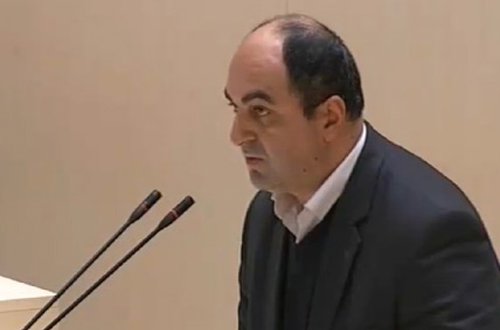Shorena Kakabadze, Imereti
The Parliament of Georgia started discussion of the Public Defender’s 2013 Report in the Human Rights Committee. Voluminous document analyzes high-profile cases, for whose impartial and effective investigation the Ombudsman requested establishment of independent investigative commission.
First committee discussion was conducted in a tense environment between majority and minority MPs on July 17.
Activities of the Chief Prosecutor’s Office, Ministries of Penitentiary, Justice, Interior, Healthcare, Education, Natural Resources and Internally Displaced People were analyzed in the report of Public Defender Ucha Nanuashvili. Addressees of majority of his recommendations were law enforcement bodies.
After hearing the report, first persons of different ministries commented on the issues, which were raised by the Public Defender in his speech. Absence of the representatives of the prosecutor’s office at the meeting caused discontent not only among opposition MPs but also among majority MPs. MP Tina Khidasheli from majority underlined that presence of the representatives of the prosecutor’s office was very important during session.
“Representatives of many institutions participated in the meeting. As for prosecutor’s office, their representatives have already participated in the committee discussion but this time they sent only detailed clarifications about the issues raised in the report,” chairwoman of the Human Rights Committee at the Parliament Eka Beselia clarified.
Case of Lapankuri special operation, case of Mamuka Mikautadze, Vano Merabishvili’s taking out from the cell, detention of former senior officials, including employees of the Tbilisi City Hall and City Council, so-called tractors’ case – Ombudsman Ucha Nanuashvili requests establishment of independent investigation commission for effective and timely investigation of the aforementioned cases.
As for Lapankuri’s case, Beselia said this case is still hot topic in Public Defender’s report. “Legislative government shall cooperate with prosecutor’s office (and we do intend it) and decide who, which particular institution shall investigate this case. Who should supervise the investigation process – MIA or Chief Prosecutor’s Office? Public Defender recommends initially the Prosecutor’s Office shall investigate the case without any partiality and dragged out procedures.
“The report reviews some violations, human rights violations, pre-trial detentions and problems in this direction; however Public Defender has not mentioned political motives in all those findings. Suspiciously he does not speak about it at all. He is not brave enough,” MP Sergo Ratiani from parliamentary minority said.
Whilst parliamentary opposition criticizes the ongoing discussion of the Public Defender’s report in the parliament, members of the Human Rights Committee state high standard of human rights protection is being established in the Georgian parliament.
“We changed negative practice of the past years. Ombudsmen were speaking about torture and degrading treatment of prisoners in prisons; members of the previous convocation parliament kept silence at his statements. Not to say anything about the fact that ministers and leaders of government institutions never attended the hearing of the Ombudsman’s reports in the Parliament. Today we have completely different situation. The process is conducted in question-answer regime. Besides that, we drafter the resolution, where most part of recommendations will be shared,” Eka Beselia said.
Hearing and discussion of the Ombudsman’s report and recommendations will continue in the Parliament’s human rights committee and finally the process will finish with the elaboration of concrete resolution. Later the Parliament will put the resolution on the motion.
News
December 13, 2023
Ethnic minorities outside the peace dialogue
November 6, 2023
‘Peace’ agenda of political parties
Popular
Articles
February 13, 2024




